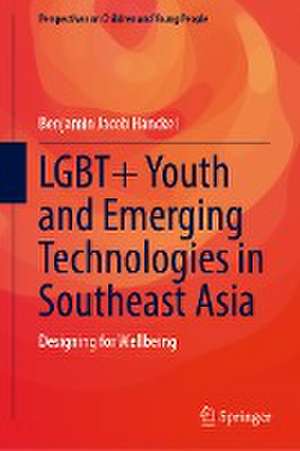LGBT+ Youth and Emerging Technologies in Southeast Asia: Designing for Wellbeing: Perspectives on Children and Young People, cartea 14
Autor Benjamin Hanckelen Limba Engleză Hardback – 31 iul 2023
Drawing on multi-site ethnographic field research, interviews, survey data, and online content analysis, the book examines the design and use of websites and content by and for LGBT+ youth. The book innovatively interrogates the design of transnational digital wellbeing initiatives, alongside the digital practices of those the technologies are designed for. It illustrates not only the (im)possibilities of technological design, but also the capacity for design to participate in what Hanckel calls ‘(trans)national digital wellbeing’ processes. He asks us to consider the ways that global technologies are contextual—a paradox that is explored throughout the book.
The analysis extends important discussions in youth research, contributing to a greater understanding of how LGBT+ youth are engaging new technologies to participate in identity-making, health and wellbeing, as well as political action. It also considers implications for digital wellbeing and digital health promotion efforts globally with young people who experience marginalisation. In doing so the book makes a critical contribution to understanding the ways that transnational digital interventions get deployed and (at times) incorporated into youth practices.
Preț: 697.00 lei
Preț vechi: 820.00 lei
-15% Nou
Puncte Express: 1046
Preț estimativ în valută:
133.39€ • 144.84$ • 112.04£
133.39€ • 144.84$ • 112.04£
Carte tipărită la comandă
Livrare economică 23 aprilie-07 mai
Preluare comenzi: 021 569.72.76
Specificații
ISBN-13: 9789819943937
ISBN-10: 9819943930
Pagini: 158
Ilustrații: XIII, 158 p. 10 illus., 8 illus. in color.
Dimensiuni: 155 x 235 mm
Greutate: 0.42 kg
Ediția:1st ed. 2023
Editura: Springer Nature Singapore
Colecția Springer
Seria Perspectives on Children and Young People
Locul publicării:Singapore, Singapore
ISBN-10: 9819943930
Pagini: 158
Ilustrații: XIII, 158 p. 10 illus., 8 illus. in color.
Dimensiuni: 155 x 235 mm
Greutate: 0.42 kg
Ediția:1st ed. 2023
Editura: Springer Nature Singapore
Colecția Springer
Seria Perspectives on Children and Young People
Locul publicării:Singapore, Singapore
Cuprins
Chapter 1. Queer Youth and New Technologies in South-East Asia.- Chapter 2. Queer Safe(r) Spaces: Designing Digital Objects.- Chapter 3. Feeling Safe and Secure: The Practices and Experiences of Queer Youth.- Chapter 4. Designing stories for YouTube: Intimate Stories for Multiple Audiences.- Chapter 5. Post-Release: Examining the Impact of the Videos.- Chapter 6. New Technologies: Affect, Risk and Intimacy.- Appendix: Methodology.
Notă biografică
Dr Benjamin Hanckel (he/him) is a sociologist at the Institute for Culture and Society and the Young and Resilient Research Centre at Western Sydney University. Benjamin’s research examines youth health and wellbeing, social inequalities, and social change. His work examines the design and use of digital technologies for health and wellbeing, and the ways digital technologies shape young people’s lives. His work also examines health interventions across complex settings and methods of evaluation. Benjamin has led research projects on health, wellbeing, and genders and sexualities research across Australia, East and South-East Asia, as well as the United Kingdom. He is a co-editor of the Journal of Applied Youth Studies, and an associate editor of Health Sociology Review.
Textul de pe ultima copertă
This book investigates the ways in which emerging digital technologies are shaping and changing the worlds of sexuality and gender diverse youth in Southeast Asia. Primarily focused on the Philippines, Indonesia, Singapore, Thailand, and Malaysia, the book examines the potential of digital technologies to enhance wellbeing in and across these contexts.
Drawing on multi-site ethnographic field research, interviews, survey data, and online content analysis, the book examines the design and use of websites and content by and for LGBT+ youth. The book innovatively interrogates the design of transnational digital wellbeing initiatives, alongside the digital practices of those the technologies are designed for. It illustrates not only the (im)possibilities of technological design, but also the capacity for design to participate in what Hanckel calls ‘(trans)national digital wellbeing’ processes. He asks us to consider the ways that global technologies are contextual—a paradox that is explored throughout the book.
The analysis extends important discussions in youth research, contributing to a greater understanding of how LGBT+ youth are engaging new technologies to participate in identity-making, health and wellbeing, as well as political action. It also considers implications for digital wellbeing and digital health promotion efforts globally with young people who experience marginalisation. In doing so the book makes a critical contribution to understanding the ways that transnational digital interventions get deployed and (at times) incorporated into youth practices.
Drawing on multi-site ethnographic field research, interviews, survey data, and online content analysis, the book examines the design and use of websites and content by and for LGBT+ youth. The book innovatively interrogates the design of transnational digital wellbeing initiatives, alongside the digital practices of those the technologies are designed for. It illustrates not only the (im)possibilities of technological design, but also the capacity for design to participate in what Hanckel calls ‘(trans)national digital wellbeing’ processes. He asks us to consider the ways that global technologies are contextual—a paradox that is explored throughout the book.
The analysis extends important discussions in youth research, contributing to a greater understanding of how LGBT+ youth are engaging new technologies to participate in identity-making, health and wellbeing, as well as political action. It also considers implications for digital wellbeing and digital health promotion efforts globally with young people who experience marginalisation. In doing so the book makes a critical contribution to understanding the ways that transnational digital interventions get deployed and (at times) incorporated into youth practices.
Caracteristici
Investigates queer young people’s use of digital tools for health and wellbeing in Southeast Asia Presents an innovative exploration of how technologies are developed, designed and used across Southeast Asia Expands our understanding of the role of digital objects in Southeast Asia












